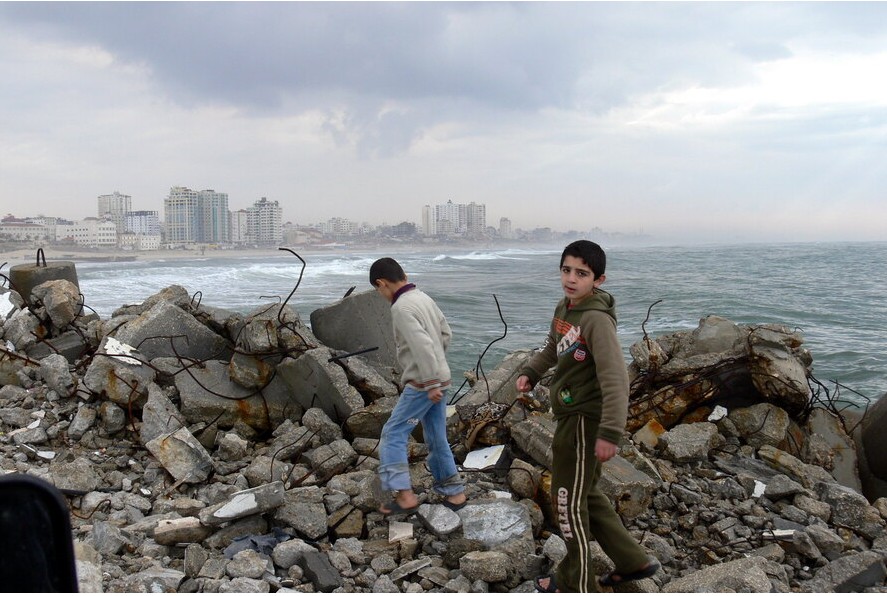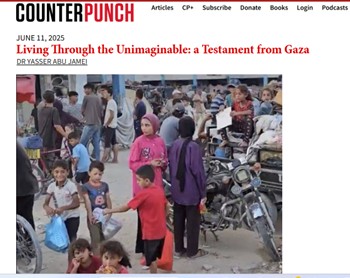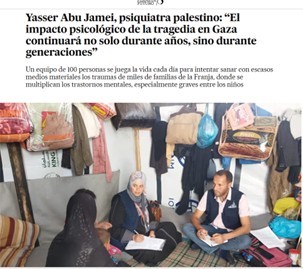
“"In Gaza, the trauma continues" Op-ed By GCMHP's Director General on the Impact of long-term suffering on the MH of Palestinians in Gaza”
Twenty years ago, when I was beginning my career as a young doctor in Gaza, I watched children playing in the streets. One boy pretended to confront imaginary Israeli army jeeps, while the other, mimicking an Israeli soldier, chased him. They were imitating what they experienced in their daily lives.
Today, in the play therapy room at the Gaza Community Mental Health Programme (GCMHP) where I work, I watch children play with toy tanks and fighter jets. Though we have every variety of toy imaginable, these are what many children choose. As they did in their play decades ago, children continue to enact what they live. Yet what they live has grown increasingly violent and traumatic but I hope that the situation will not get worse.
This traumatising violence was on full display last summer during Israel’s bombardment of Gaza, a small, overcrowded slice of Mediterranean coastal territory that has been under Israeli military occupation for 56 years and under a crippling Israeli imposed siege and naval blockade for 15 years. The more than two million Palestinians trapped in Gaza have nowhere to run or seek protection when Israeli bombs start dropping. Last summer’s offensive killed 46 people, 16 of them children, in three days. More than 150 children were among the injured.
Children in Gaza had not yet psychologically healed from the previous large-scale Israeli bombardment in May 2021. Moreover, since 2008, there have been five devastating Israeli assaults on Gaza and numerous smaller ones. Recently, Save the Children released a report in which they found that 80% of children in Gaza reported signs of emotional distress. With approximately 1,000,000 children in Gaza (47% of the population), this translates to 800,000 children living with fear, depression, anxiety, grief — and this was before the most recent violence.
In the months and years to come, there will be more kids who are afraid to separate from their parents. Children will resume bedwetting, experience nightmares or other sleep disturbances. There will be an increase in children who act out aggressively, and in those who shut down entirely. Kids will have trouble concentrating in school. Some may develop suicidal thoughts.
As a mental health professional, I understand the typical trajectory of trauma and recovery. A population lives in safety. The traumatic event occurs. The population’s safety is disrupted, and the threat of harm is acute. Then, help and support arrives, the threat subsides, and the population’s central task is to resume normal life so that healing can begin.
No aspect of this applies in Gaza. Life before the latest bombardment was already defined by ongoing trauma, spanning generations. Two-thirds of Gaza’s population are refugees or descendants of refugees who were expelled from what became Israel in 1948 and denied their right to return. Add to that over half a century of brutal Israeli military rule, and a decade and a half of siege and blockade — which have been condemned by the UN and human rights groups as collective punishment of the entire population and illegal. As a result of this man-made humanitarian disaster, there is a dire shortage of clean water, electricity, and medical supplies. People are unable to travel abroad or to the West Bank to access life-saving medical care, to study, work, or visit family and friends. This has all contributed to endemic poverty. Over half the population of Gaza is impoverished with an unemployment rate of 44.7%, which is even higher for young people.
How can there be a return to ‘normal life’ when conditions here are so dire that the UN has issued repeated warnings that Gaza may soon become unliveable? How can our children recover a sense of safety when they’ve never felt safe? Even after the ceasefire, Israeli military drones buzzing regularly overhead trigger their traumatic memories, heightened by the knowledge that another assault is inevitable. At GCMHP, we do our best to address this trauma and bring hope but the ongoing reality of violence and deprivation stifles healing processes.
I don’t want Gaza’s children — including my own kids — to merely survive. I want them to thrive and reach their full potential in peace, security and freedom, as all children should be able to do. It is our duty as mental health providers, teachers and parents to support these children. Repeatedly traumatising them and depriving them of the essentials of life doesn’t benefit anyone, including Israelis.
The US and the international community must pressure Israel to finally end the blockade, respect human rights, and to stop its attacks on Gaza, so that Gaza’s children know something other than violence, deprivation and fear.
Yasser Abu Jamei




Read Comments
Steven Rich
March 10, 2019Omnis iste natus error sit voluptatem accusantium nam libero tempore, cum soluta nobis est eligendi optiocumque nihil impedit quo minus id quod maxime.
Van Wimbilton
March 10, 2019Natus error sit voluptatem accusantium nam libero tempore, cum soluta nobis eligendi optio cumque nihil impedit quo minus id quod maxime.